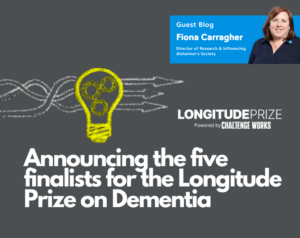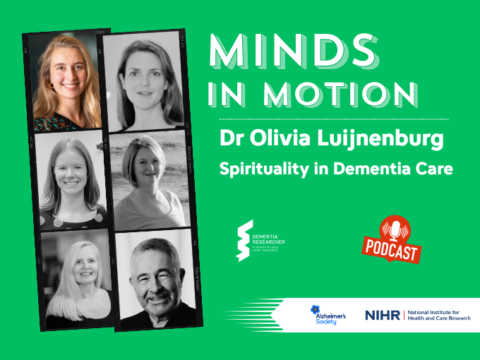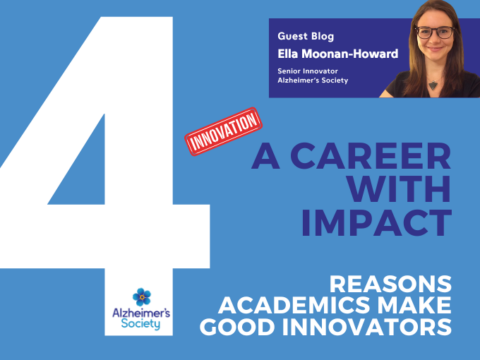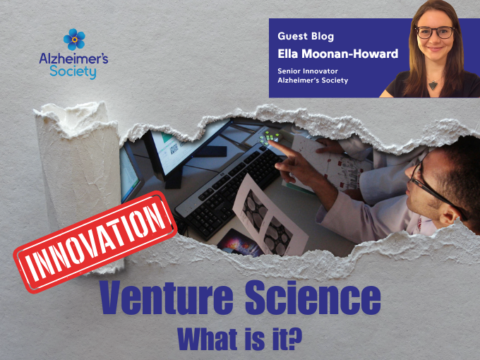 Five groundbreaking innovations developed across the globe have been announced as finalists in the £4.4m Longitude Prize on Dementia.
Five groundbreaking innovations developed across the globe have been announced as finalists in the £4.4m Longitude Prize on Dementia.
The global competition for innovative technologies to help people with dementia stay independent for longer has resulted in game-changing solutions from around the world.
Presenting a session at Alzheimer’s Europe in Geneva in October where we heard from the five finalist teams, I felt incredibly proud that Alzheimer’s Society is a part of this.
The prize, which we at Alzheimer’s Society co-fund alongside Innovate UK is delivered by Challenge Works.
We got involved because we need to radically change the story for people affected by dementia.
This is a condition which affects around 55 million people worldwide, including 1 million in the UK. People living with dementia need creative tech which can offer a better quality of life and drastically change the experience of living with dementia.
The products and solutions in the final five offer exactly that.
The finalists
Finalists from The MARCS Institute at Western Syndney University have adapted a traditional telephone that reminds users of their daily activities and offers a screen for video calls so that ringing a loved one is as easy as picking up the phone.
Associação Fraunhofer Portugal Research has produced a smartwatch learns about users’ activities and guides them on their daily routines. It can prompt them on actions they may have forgotten (*close the fridge door) and alert a carer if they do not respond.
Animorph Co-operative has developed high-tech glasses that help users recognise objects and people. The lenses (which work with prescriptions) create a halo around the object being viewed. It then describes what it is (“pen”) and what to do (“write with it”).
Clairvoyant Networks has adapted Ultra Wideband technology – a high-precision sensor used to track the football during the World Cup – to create an Artificial Intelligence system that predicts falls. The wearable tech can monitor signs such as gait which can predict a fall.
Supersense Technologies has developed a monitoring box which detects where someone is in their home and updates carers (for example: your mum is up and about). The system comes without a camera so protects the privacy of the user.
The Longitude Prize on AMR
As a member of the Longitude Prize Committee, I was at the event in June where the winner of the first Longitude Prize on AMR (antimicrobial resistance) was announced. The winning device from Sysmex Astrego can detect if someone has a UTI and which specific antibiotic they need. Tests can be performed in a doctor’s surgery rather than a lab and, if used at scale, it will ultimately help us better use the antibiotics we have – including bringing some ‘retired’ antibiotics could come back into use.
The impact will be extraordinary. This is the kind of monumental opportunity we have with the Longitude Prize on Dementia.
The Longitude Prize on Dementia started as a pipe dream in the middle of the COVID-19 pandemic. From the seed of an idea, grew a competition which has exceeded my expectations.
This is going to change things
There are moments in your career when you see hope take a step forward. When you realise that this is big, this is going to change things.
Over the last ten years I’ve realised dementia is one of the biggest health and social care challenges we face.
The challenges we face here in the UK are replicated globally and it’s been a privilege to work with partners from across the world to understand their perspective and share knowledge.
What I’ve learnt is that we are all facing the same challenges and our hopes and dreams are the same.
People living with dementia want to be able to live independently in their homes. Those closest to them want to be confident they are safe and have the assistance they need.
A survey commissioned earlier this year by Alzheimer’s Society amongst carers of someone with dementia living at home found that seven out of ten carers (70%) were concerned that their loved one was unable to look after themselves and almost half (44%) felt that adapting the house to make it work better was difficult.
These are real challenges faced by people affected by dementia which could be helped by the innovations we’ve heard about today.
Each of the five finalists has been awarded £300,000 to further develop their solutions. In 2026, one will secure the top £1million prize.
I can’t wait to see how these phenomenal technologies have progressed by then!

Fiona Carragher
Author
Fiona Carragher is Alzheimer’s Society’s Director of Research and Influencing. She plays a pivotal role in the Society’s vision to create a world without dementia: leading their world-class research programme. A Consultant Clinical Biochemist by background, Fiona has worked in multi-professional teams for two decades at a range of large hospitals, including the Royal Hospital for Sick Children (Edinburgh) and Kings College Hospital (London) – with a focus on providing high quality, innovative services. Prior to joining the Society, Fiona was the Deputy Chief Scientific Officer for NHS England.

 Print This Post
Print This Post




